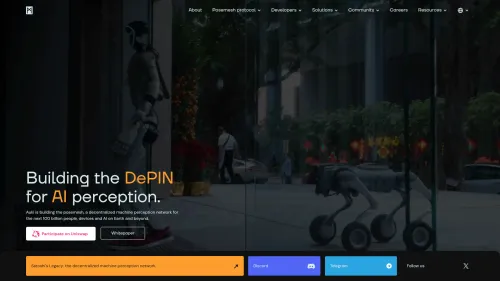AUKI (AUKI)
The Posemesh is a decentralized spatial computing and machine perception network that aims to bridge the gap between artificial intelligence (AI) and the physical world. By enhancing spatial awareness, The Posemesh empowers AI to operate beyond the confines of the internet and engage with the real-world environment. This transformative technology is designed to serve the next generation of people, devices, and AI, estimated to reach 100 billion in number.
The vision of The Posemesh
The primary vision of The Posemesh is to enable AI to interact with the physical world through spatial computing. This involves creating a network that enhances machine perception, allowing AI to make more informed decisions based on its surroundings. The Posemesh network is designed to facilitate this interaction by utilizing a decentralized infrastructure that can support a vast number of users and devices.

| Ticker | AUKI |
| Category | Artificial Intelligence (AI) |
| Website | https://auki.ai/ |
| @aukinetwork | |
| Telegram | AukiNetwork |
| Contract Addresses | |
|---|---|
| base | 0xf9...f4 Copied! Copied! |
The role of spatial computing and machine perception
Spatial computing refers to the process of using digital technology to interact with the physical world. It involves the integration of 3D environments with digital information to enable a more immersive experience. Machine perception, on the other hand, involves the ability of computers to interpret data from the physical world, such as visual, auditory, and spatial information, to make decisions or perform tasks.
By combining these two fields, The Posemesh allows AI systems to achieve a higher level of spatial awareness, enabling them to understand and interact with their environment more effectively. This capability is crucial for a wide range of applications, from retail and logistics to personal navigation and social interactions.
Traction and milestones
The Posemesh has achieved significant milestones in its journey to revolutionize spatial computing and machine perception. These accomplishments highlight the growing importance and potential of this technology in various industries.
Expansion of posemesh domains
The network boasts over 700 Posemesh domains worldwide, reflecting its rapid expansion and adoption. Users can create their own domains by obtaining a portal kit and setting it up in just a few minutes. Additionally, the network offers an application called McKenna, which allows users to decorate their domains with NFTs, images, videos, 3D assets, and text notes, enhancing the user experience.
Retail partnerships and pilots
The Posemesh has successfully conducted a six-month pilot with Coop, a major grocery retailer in Sweden, integrating spatial AI to improve staff productivity. This initiative has resulted in significant time savings, with employees gaining more than 15 minutes per day, thereby increasing their self-sufficiency.
Furthermore, The Posemesh is engaged in a multi-store pilot with another leading Swedish grocery retailer. This retailer has committed to a full rollout within the next 12 months. Interest in Spatial AI is also growing among the top 10 global retailers, particularly for applications such as empty shelf detection, planogram compliance, ESL positioning, and realograms, which provide a detailed understanding of store item locations.
Global reach and applications
The Posemesh is actively involved in pre-pilot planning with some of Europe and North America's largest grocery retailers. Collectively, these retailers operate over 40,000 stores and employ hundreds of thousands of staff. The technology is also being used for real-time indoor navigation and friend finding at large events and venues, showcasing its versatility and practicality.
Developer and user engagement
The network has attracted a robust community of 40,000 DePIN app users on Telegram and supports 300+ DePIN servers globally. This infrastructure is intentionally capped to prevent over-provisioning, ensuring optimal performance and reliability. Additionally, over 450 app developers are leveraging the Posemesh SDK to build shared and persistent augmented reality (AR) experiences, further expanding the network's ecosystem.
